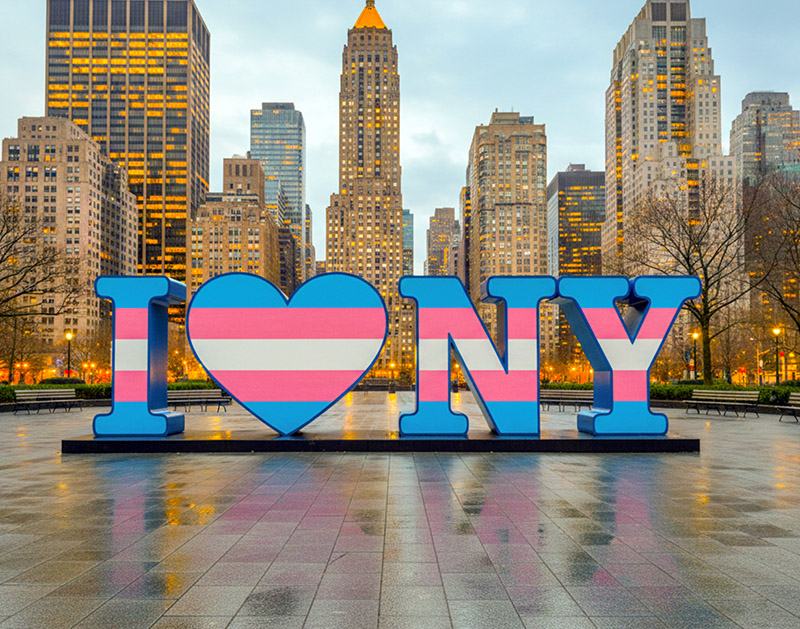FBI Could Label Transgender Suspects as ‘Violent Extremists’
The Trump administration is considering classifications that could target transgender activists under new extremist labels.

The Trump administration is reportedly planning to classify specific transgender suspects as “violent extremists,” according to journalist Ken Klippenstein. Writing on his Substack, Klippenstein said two national security officials told him that the FBI intends to treat transgender suspects as a subset of the Bureau’s newly created “Nihilistic Violent Extremists” (NVE) category.
The NVE designation was created earlier this year to replace the Biden-era label “Anti-Authority and Anti-Government Violent Extremists” (AGAAVE), which had been used to categorize participants in the January 6 Capitol riot and other right-wing or anti-government groups.
Klippenstein reports the new classification “gives Trump officials political cover.” Rather than labeling transgender people broadly as an “enemy,” the administration appears focused on targeting those it deems engaged in so-called “gender ideology extremism.”
It remains unclear what qualifies as “gender ideology extremism,” or how law enforcement would distinguish between transgender people advocating for civil rights and those allegedly driven to violence by such beliefs.
A senior intelligence official told Klippenstein the FBI is “cynically targeting trans people because the shooter’s lover was trans,” adding: “The administration has convinced itself that the Charlie Kirk murder exposes some dark conspiracy.”
The official said there is no formal process for treating transgender people as a “threat group,” but predicted they will be increasingly targeted — and likely surveilled — under the banner of “violent extremism.”
Conservatives have increasingly tried to link mass violence to transgender identity, arguing that transgender people are mentally ill and commit disproportionate acts of violence — a belief that has even led some in the Trump administration to suggest restricting their access to firearms.
Prosecutors in the case against Tyler Robinson, the alleged killer of Charlie Kirk, have emphasized that Robinson was motivated by Kirk’s rejection of transgender identity, with the indictment referencing transgender-related topics at least three times, Klippenstein reports.
FBI Director Kash Patel said the Bureau is reviewing Robinson’s entire network of contacts — far beyond the 20 people in his Discord group — suggesting that other transgender individuals, including Robinson’s alleged partner, may be surveilled under suspicion of prior knowledge of the plot to kill Kirk.
In his second term, Trump has escalated attacks on transgender people, barring them from military service, restricting school and prison policies, and denying funding to groups that “promote gender ideology.”
Two days before Kirk’s killing, Trump railed against “transgender insanity.” Afterward, he blamed “radicals on the left,” saying, “they want transgender for everyone.”
As journalist Erin Reed noted on her Erin in the Morning Substack, within hours of Klippenstein’s report the Heritage Foundation’s Oversight Project released a four-page memo urging the FBI to go further. The organization also launched a petition seeking public support for its proposal.
Under the proposal, the FBI would formally classify all forms of transgender activism as “Trans Ideology-Inspired Violent Extremism” (TIVE), a move Heritage argues would let the Bureau “employ investigative techniques” to prevent violence.
Heritage argues the FBI’s “Nihilistic Violent Extremists” label is overly broad and “flawed,” claiming transgender extremists are not motivated by nihilism or a lack of ideology.
The Heritage memo defines “Trans Ideology-Inspired Violent Extremism” as the belief that violence is justified against anyone who opposes, rejects, or is indifferent to “transgender ideology,” which it describes as rejecting the idea that sex is binary and fixed at birth, based on biological characteristics.
The memo further claims that “trans-inspired violent extremism” includes the belief that rejecting or failing to support “transgender ideology” is itself a form of violence, a threat to transgender people’s existence, or an “imminent threat” to their safety — including risks of self-harm or suicide.
Much of the rhetoric used to oppose anti-trans legislation or executive orders echoes language Heritage wants the FBI to treat as terroristic — even as the group insists people would remain “free to identify as transgender, or support LGBT causes or transgenderism in a nonviolent way.”
Reed warns that under Heritage’s proposed two-prong test, “nearly every transgender rights activist or organization — merely for pointing out the tangible harm that comes from losing rights — would fall under the label of extremist.”
In its memo, Heritage suggests the FBI could deploy tools such as human sources, network mapping, undercover operations, and data analysis to monitor alleged extremists. The group even cites examples of “extremist” symbols or terms, including the transgender flag with the phrase “Protect their right to exist,” or words like “cisgender,” “deadnaming,” “misgendering,” “right to exist,” and “erased.”
Reed says this framework would effectively allow the government to treat transgender-rights leaders and organizations as security threats, casting constitutionally protected advocacy as extremism.
If the FBI adopted such a category and relied on Heritage’s flagged language, activists, allies, journalists, and progressive media outlets could be targeted for supposedly “extremist” rhetoric.
Reed likened Heritage’s proposal to Russia’s anti-LGBTQ policies, noting the Trump administration has already floated similar plans to dismantle nonprofits it views as ideological opponents.
Reed stressed that while neither proposal has been implemented, Heritage wields significant influence in the Trump administration, making a crackdown “more than theoretical.” She warned that even without labeling every trans person a terrorist, the proposals create machinery for surveillance and disruption — “tools that echo some of the darkest chapters of American history.”
Get the latest LGBTQ news and analysis from Metro Weekly. Subscribe to our free newsletter.
Support Metro Weekly’s Journalism
These are challenging times for news organizations. And yet it’s crucial we stay active and provide vital resources and information to both our local readers and the world. So won’t you please take a moment and consider supporting Metro Weekly with a membership? For as little as $5 a month, you can help ensure Metro Weekly magazine and MetroWeekly.com remain free, viable resources as we provide the best, most diverse, culturally-resonant LGBTQ coverage in both the D.C. region and around the world. Memberships come with exclusive perks and discounts, your own personal digital delivery of each week’s magazine (and an archive), access to our Member's Lounge when it launches this fall, and exclusive members-only items like Metro Weekly Membership Mugs and Tote Bags! Check out all our membership levels here and please join us today!


























You must be logged in to post a comment.